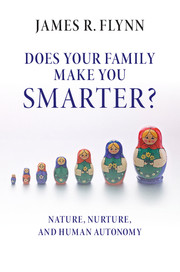Book contents
- Frontmatter
- Dedication
- Epigraph
- Contents
- List of figures, tables and boxes
- Acknowledgments
- Part I Human autonomy
- Part II Intelligence
- 7 The Raven's revolution
- 8 Learning from astronomy
- 9 The meta-theory of intelligence
- 10 Scientific theories of intelligence
- 11 Psychology and Cardinal Bellarmine
- For scholars who wish to use the Age-Table Method to measure family effects in nations other than the USA
- Appendix I Wechsler Vocabulary and description of method of analysis
- Appendix II Stanford-Binet Vocabulary
- Appendix III Raven's Progressive Matrices
- References
- Name index
- Subject index
7 - The Raven's revolution
from Part II - Intelligence
Published online by Cambridge University Press: 05 June 2016
- Frontmatter
- Dedication
- Epigraph
- Contents
- List of figures, tables and boxes
- Acknowledgments
- Part I Human autonomy
- Part II Intelligence
- 7 The Raven's revolution
- 8 Learning from astronomy
- 9 The meta-theory of intelligence
- 10 Scientific theories of intelligence
- 11 Psychology and Cardinal Bellarmine
- For scholars who wish to use the Age-Table Method to measure family effects in nations other than the USA
- Appendix I Wechsler Vocabulary and description of method of analysis
- Appendix II Stanford-Binet Vocabulary
- Appendix III Raven's Progressive Matrices
- References
- Name index
- Subject index
Summary
Questions
(1) Why was Raven's once thought to be the purest measure of a kind of intelligence largely stable over time?
(2) Now that we know that cognitive progress over time can be rapid, does this mean that Raven's lacks significance?
The Age-Table Method of measuring family effects can also be used on Raven's Progressive Matrices. In 1935, when John C. Raven (then 35 years old) sat at his kitchen table and began to experiment with snowflake designs, he was merely a M.Sc. candidate at the University of London. And yet, what he invented became the most important test in the history of intelligence. It had as its companion the Mill Hill Vocabulary Scale. Spearman, the great inventor of factor analysis, had distinguished two main components of intelligence: eduction, or the ability to make sense out of complexity – that is, perceive logical sequences despite distracters that can become very confusing indeed; and reproduction, or the ability to store and retrieve what is learned – for example, vocabulary. The Progressive Matrices were designed to measure the former; the Vocabulary Scale, the latter.
Particularly after twin studies began to partition individual IQ differences into variance explained by unequal genetic endowment and by unequal environments, Jensen and his followers deemed Raven's the best measure of intelligence existent; and described what it measured to be an attribute deeply embedded in the human brain and therefore largely impervious to any kind of sudden change.
The presumed stability of intelligence
Intelligence was supposed to be stable precisely because it was genetically influenced. Therefore, it was unlike learning, which is at the mercy of what kind of education your environment provides. Just as, under normal conditions, your genes determine your height relative to others, so your genes determine the neural framework of your brain and its capacity to solve complex cognitive problems. As for the average intelligence of the human race, it had evolved by natural selection and while that process will of course continue, it will be slow.
There is a corollary: some of the behaviors peculiar to the last two centuries can accelerate the rate of change but only because they impinge on genes.
- Type
- Chapter
- Information
- Does your Family Make You Smarter?Nature, Nurture, and Human Autonomy, pp. 83 - 96Publisher: Cambridge University PressPrint publication year: 2016



